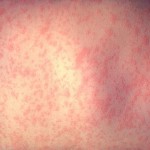Measles, a forgotten scourge, makes a comeback in Europe
Measles, a viral infection thought to be largely eradicated in the developed world, has staged a dangerous comeback in France and other parts of Europe.
A report by the World Health Organization confirmed a measles outbreak in France of about 4,937 cases from January to March 2011 alone compared to 5,090 cases in all 12 months of last year. Other European countries have also reported a spike in measles. The overall total so far was about 6,500 cases according to WHO officials.
Health experts said that the figures reflect the slide in vaccination efforts in many European countries. Partly to blame for that is the bogus study made in 1998 that falsely linked an MMR (measles, mumps, rubella) vaccine to autism in children. Some parents who were fearful that their children can get sick chose to forego vaccination for their children.
"There's been a buildup of children who have not been immunized over the years," WHO's Rebecca Martin told AP. She heads the UN health agency's Copenhagen office for vaccine-preventable diseases.
Because of the autism scare, vaccination rates in the UK dropped to 50 percent, while also registering similar declines elsewhere in Europe. Health care professionals need to vaccinate about 90 percent of the target population in order to prevent measles outbreaks.
Spain, Macedonia, Germany, Norway, Russia, Romania and the Netherlands have also reported measles outbreaks in recent months. Many European travelers have brought the virus to countries abroad such as the United States, officials said.
The virus is spread through coughing and sneezing. Fever, cough, rash and characteristic spots on the cheek and inside the mouth are the symptoms of measles.
